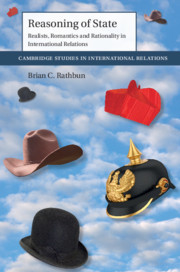Reasoning of State Realists, Romantics and Rationality in International Relations Cambridge Studies in International Relations Series
Langue : Anglais
Auteur : Rathbun Brian C.

Challenges the assumption of the rationality of foreign policy makers in international relations, showing how leaders systematically vary in the rationality of their thinking.
Scholars and citizens tend to assume that rationality guides the decision-making of our leaders. Brian C. Rathbun suggests, however, that if we understand rationality to be a cognitive style premised on a commitment to objectivity and active deliberation, rational leaders are in fact the exception not the norm. Using a unique combination of methods including laboratory bargaining experiments, archival-based case studies, quantitative textual analysis and high-level interviews, Rathbun questions some of the basic assumptions about rationality and leadership, with profound implications for the field of international relations. Case studies of Bismarck and Richelieu show that the rationality of realists makes them rare. An examination of Churchill and Reagan, romantics in international politics who sought to overcome obstacles in their path through force of will and personal agency, show what less rationality looks like in foreign policy making.
Introduction: three theoretical arguments, four 'great men' of history, multiple methods, and disciplines; 1. The psychology of rationality: cognitive style in international relations; 2. The three 'r's of international relations: realism, romanticism and rationality; 3. Little Bismarcks: a laboratory experiment on variation in rational thinking and rational behavior; 4. The 'prince' among men: Bismarck's realpolitik in Prussian politics; 5. Cold blood and iron: Bismarck, the struggle with Austria and German unification; 6. Blind faith: Richelieu, the devoted, and France in counter-reformation Europe; 7. 'Blood, toil, tears and sweat': Churchill, romanticism and the rational appeasement debate; 8. 'In defeat, defiance': Churchill in words (1935–39) and in deeds (1940) with Therese Anders; 9. 'Beginning the world all over again': resolving the paradox of Ronald Reagan; 10. Winning one as the Gipper? Reagan's administration and American engagement with the Soviet Union; Conclusion: the irrationality of rational choice: saving a paradigm from itself; References; Index.
Brian C. Rathbun is a Professor in the School of International Relations at the University of Southern California. He is the author of Partisan Interventions (2004), Trust in International Cooperation (2011) and Diplomacy's Value (2014), which won the best book award from the Diplomatic Studies Section of the International Studies Association. He has published articles in journals, such as International Organization, World Politics, International Security and International Studies Quarterly, among others.
Date de parution : 02-2019
Ouvrage de 348 p.
15.7x23.5 cm
Date de parution : 02-2019
Ouvrage de 350 p.
15.2x22.8 cm
Thème de Reasoning of State :
© 2024 LAVOISIER S.A.S.



